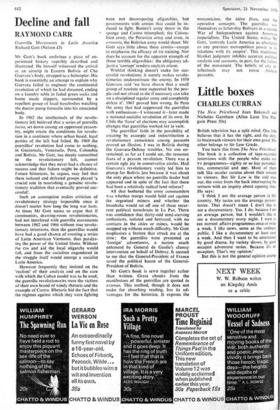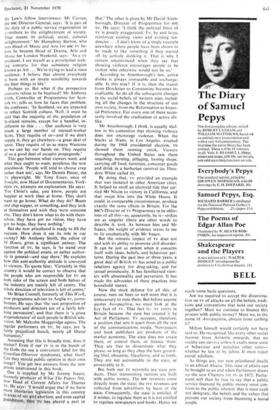Little boxes
CHARLES CURRAN
The New Priesthood Joan Bakewell and Nicholas Garnham (Allen Lane The Pen- guin Press 50s) British television has a split mind. One lobe believes that it has the right, and the duty, to brainwash viewers for their own good. The other belongs to Sir Lew Grade.
You learn this from-The New Priesthood. The book is a collection of tape-recorded interviews with the people who make our Tv programmes—eighty or so key personali- ties, commercial and Bic. Most of them talk like secular curates about their mission to viewers. But Sir Lew is the odd man out, the voice from the back interrupting the sermon with an inquiry about opening time. He says: 'I think I am the average person in this country. My tastes are the average person's tastes. That doesn't mean I don't like to see a documentary. Yes, I do, because I am an average person, but I wouldn't like to see a documentary every night. I want to see current affairs programmes once or twice a week. I like news, same as the ordinary public. I like a documentary at least once a week. And then I want to be entertained by good drama, -by variety shows, by good escapist adventure series. Because it's all escapism. That's my opinion.' But this is not the general opinion among Sir Lew's fellow interviewees. Mr Curran, the Bac Director-General, says: 'It is part of the duty of a public service organisation to contribute_ to the enlightenment of society. That means its political, social, cultural enlightenment' Mr Humphrey Burton, who
was Head of Music and Arts for BBC Tv be- fore he became Head of Drama, Arts and Music for London Weekend, says: 'As a TV
producer, I see myself as a proselytiser seek- ing converts for that substitute religion known as Art ... We're trying to lead a mass audience. I believe that almost everybody is born with an innate sensibility towards the finer things in life' Perhaps so. But what if the prospective converts refuse to be baptised? Mr Anthony Firth, Controller of Programmes for Scot-
tish TV, tells us how he faces that problem. He confesses: 'In Scotland, we are expected to reflect Scottish culture. Well, it must be said that the majority of the population of Scotland remains, except for a handful, in- different to this . . . Our audience is very much a large number of manual-worker Scots. They require of us—and if we don't supply it, they go elsewhere—a great deal of sport. They require of us as many Westerns as we can lay our hands on. They require of us a good deal of escapist propaganda.'
This gap between what viewers want, and what they ought to want, perplexes the new priesthood. People will tend to choose crap rather than not', says Mr Dennis Potter, the TV playwright. Mr Tony Essex, once of Tonight, now Head of Documentaries, York- shire Tv, attempts an explanation. He says: `For Christ's sake, you know, people are happier at work than at home. They don't want to go home. What do they do? Beans and chip supper, or something, and they look at themselves and wish they were someone else. They don't know what to do with them- selves, they have got no vision, they have got no hope, they have nothing.'
But the new priesthood is ready to fill the vacuum. How does it see its role in our society? Mr Anthony Smith, the editorof 24 Hours, gives a significant answer. The function of Tv, he says, is `to stand over against the political estate, or rather author- ity in general—and stay there' He explains how this anti-authority attitude is conveyed to viewers. To quote him: 'Certainly in this country it would be correct to observe that the people who are responsible for Tv on both sides of the screen and both halves of the industry are mainly left of centre. The whole direction of television is left of centre' Mr Brian Connell, formerly of This Week, now programme adviser to Anglia Tv, corro- borates. He says that 'the vast proportion of producers and directors are of a fairly left- wing persuasion', and that there is 'a gross preponderance' of such people in British tele- vision. Mr Malcolm Muggeridge agrees. The regular performers on TV, he says, are 'a fairly prejudiced bunch, nearly all liberal humanists.'
Assuming that this is broadly true, does it matter? Even if our Tv is in the hands of the Gobs (to use a convenient label for the Guardian-Observer syndrome), what then? Can they mould public opinion in their own image? You get two answers from the new priests interviewed in this book.
One is supplied by Mr Jeremy Isaacs, formerly producer of What The Papers Say, now Head of Current Affairs for Thames TV. He says: would argue that if we have more libertarian legislation in this country in areas of sex and abortion, and even capital Punishment, then Tv has played a part in that' The other is given by Mr David Atten- borough, Director of Programmes for BBC
Tv. He says: '1 think the political force of
TV is greatly exaggerated. Tv, by and large, reinforces existing views and existing ten-
dencies ... 1 don't know of a single example anywhere where people have been shown to be made to like something if they started off by actively disliking it. That is why I remain unconvinced when they say that showing violence encourages people to be violent who otherwise would not be so.'
According to Attenborough's law, active dislike is always immutable and unchange- able. Is this true? If it is, then the transit from Diocletian to Constantine becomes in- explicable. So do all the subsequent changes in the social beliefs of western man, includ- ing all the changes in the structure of our own society, from the Reformation to Imper- ial Preference. For every one of them neces- sarily involved the eradication of active dis- like.
Mr Attenborough. I think, is equally shal- low in his contention that showing violence does not encourage violence. When the blacks at Watts, in Los Angeles, erupted during the '1968 presidential election, Tv showed' them running amok. Viewers throughout the United States saw them smashing, burning, pillaging, looting shops, carrying off food, furniture, consumer goods and drink in a barbarian carnival (as Theo- dore White called it).
By doing that, Tv provided an example that was imitated in other American cities. It helped to swell an electoral tide that car- ried Mr Nixon to victory in California, and that swept him into the White House. It could, in comparable circumstances, produce exactly the same effects in Britain. For the BBC's Director of TV Programmes to be obliv- ious of all this—as, apparently, he is—strikes me as singular (there are other words to describe it, too). As between him and Mr Isaacs, the weight of evidence seems to me to lie emphatically with Mr Isaacs.
But the mimetic impact of TV does not end with its ability to promote civil disorder. It can be just as potent when it concerns itself with ideas, beliefs, and behaviour pat- terns. During the past two or three years, a great deal of British TV has acted as a public relations agency for drug-taking, and for sexual promiscuity. It has familiarised view- ers with abnormality and perversion. It has made the advocates of these practices into household names.
Now the stock defence for all this, of course, runs on lines so well-worn that it is unnecessary to state them. But before anyone quotes Areopagitica, we must look at the key fact of TV. That fact is: Tv exists in Britain because the state has created it by Act of Parliament. Tv occupies, therefore, a position that sets it apart from all the rest of the communications media. Newspapers and book publishers are products of the market economy. The state does not create them, or control them, or finance them. They are free to disseminate what they please, so long as they obey the laws govern- ing libel, obscenity, blasphemy, and so forth. They are not accountable to the state, or answerable to it.
But both our ry networks are state pro- ducts. Their transmitting stations are built with public money. The BBC revenues come directly from the state; the Iry revenues are collected from advertisers by leave of the state. 'Consequently, the state is entitled, if it wishes, to regulate them as it is not entitled to regulate newspapers and books. Hence we
reach some basic questions.
Are we required to accept the dissemina- tion on Tv of attacks on all the beliefs, tradi- tions and conventions that hold our society together? Must we continue to finance this process with public money? Must we, in the name of Areopagitica, abstain from curbing it?
Milton himself would certainly not have said so. He recognised, like every other social theorist from Aristotle onwards, that no society can survive unless it exalts some sorts of behaviour and penalises other sorts— whether by law or by taboo. It must reject moral nihilism.
As things are, our new priesthood dwells in an ethical Alsatia. This state of affairs can be brought to an end when Parliament draws up the new Charters for TV in 1975. Parlia- ment will then be free to say that a public service financed by public money must con- form to the public interest: that it must exalt not denigrate, the beliefs and the values that prevent our society from becoming a moral jungle.















































 Previous page
Previous page